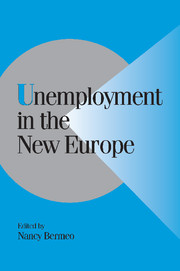Book contents
- Frontmatter
- Contents
- List of Contributors
- INTRODUCTION
- Part I Macroeconomic Contexts and Models
- Part II Unemployment and Domestic Bargaining Institutions: Challenging Some Myths
- Part III Unemployment and Domestic Bargaining Institutions: Three Cases
- 6 UNEMPLOYMENT AND TRADE UNION STRENGTH IN PORTUGAL
- 7 TRADE UNIONS, UNEMPLOYMENT, AND WORKING-CLASS FRAGMENTATION IN SPAIN
- 8 MODELL NEDERLAND: SOCIAL PARTNERSHIP AND COMPETITIVE CORPORATISM IN THE NETHERLANDS
- Part IV Unemployment, Voting, and Political Behavior
- Index
7 - TRADE UNIONS, UNEMPLOYMENT, AND WORKING-CLASS FRAGMENTATION IN SPAIN
Published online by Cambridge University Press: 26 March 2010
- Frontmatter
- Contents
- List of Contributors
- INTRODUCTION
- Part I Macroeconomic Contexts and Models
- Part II Unemployment and Domestic Bargaining Institutions: Challenging Some Myths
- Part III Unemployment and Domestic Bargaining Institutions: Three Cases
- 6 UNEMPLOYMENT AND TRADE UNION STRENGTH IN PORTUGAL
- 7 TRADE UNIONS, UNEMPLOYMENT, AND WORKING-CLASS FRAGMENTATION IN SPAIN
- 8 MODELL NEDERLAND: SOCIAL PARTNERSHIP AND COMPETITIVE CORPORATISM IN THE NETHERLANDS
- Part IV Unemployment, Voting, and Political Behavior
- Index
Summary
The growth and transformation of Spain's economy since the death of Franco have been remarkable. The long period of socialist government from 1982 to 1996 was notable for its extensive program of economic restructuring and deregulation, and Spain's entry into the European Community (EC) in 1986. During its first term of office (1982–86), the Partido Socialista Obrero Español (PSOE) implemented measures of economic austerity, restructuring, and adjustment, including an immediate devaluation of the currency, the adoption of a restrictive monetary policy, a gradual reduction of the budget deficit, liberalization of trade, deregulation of the financial markets, and a move to a more flexible labor market. Wage increases were limited by means of agreements with the employers and the unions in 1983 and 1984, while the 1984 Law on Reconversion and Industrialization restructured the finances of industrial sectors such as iron and steel, shipbuilding, and textiles. The government also liberalized housing rents, retail shopping hours, and laws governing foreign investment and launched a program of privatization of state-owned companies. Following its reelection in 1986, the PSOE further liberalized and deregulated the economy to increase its levels of productivity and international competitiveness. Given the need to comply with the EC's requirements prior to the introduction of the European Single Market, the economy was further opened up through the liberalization of foreign trade and banking and reform of the stock exchange, capital markets, and the national banking sector. Further measures of privatization involved the total or partial selling off of state-owned companies.
- Type
- Chapter
- Information
- Unemployment in the New Europe , pp. 203 - 244Publisher: Cambridge University PressPrint publication year: 2001
- 18
- Cited by



